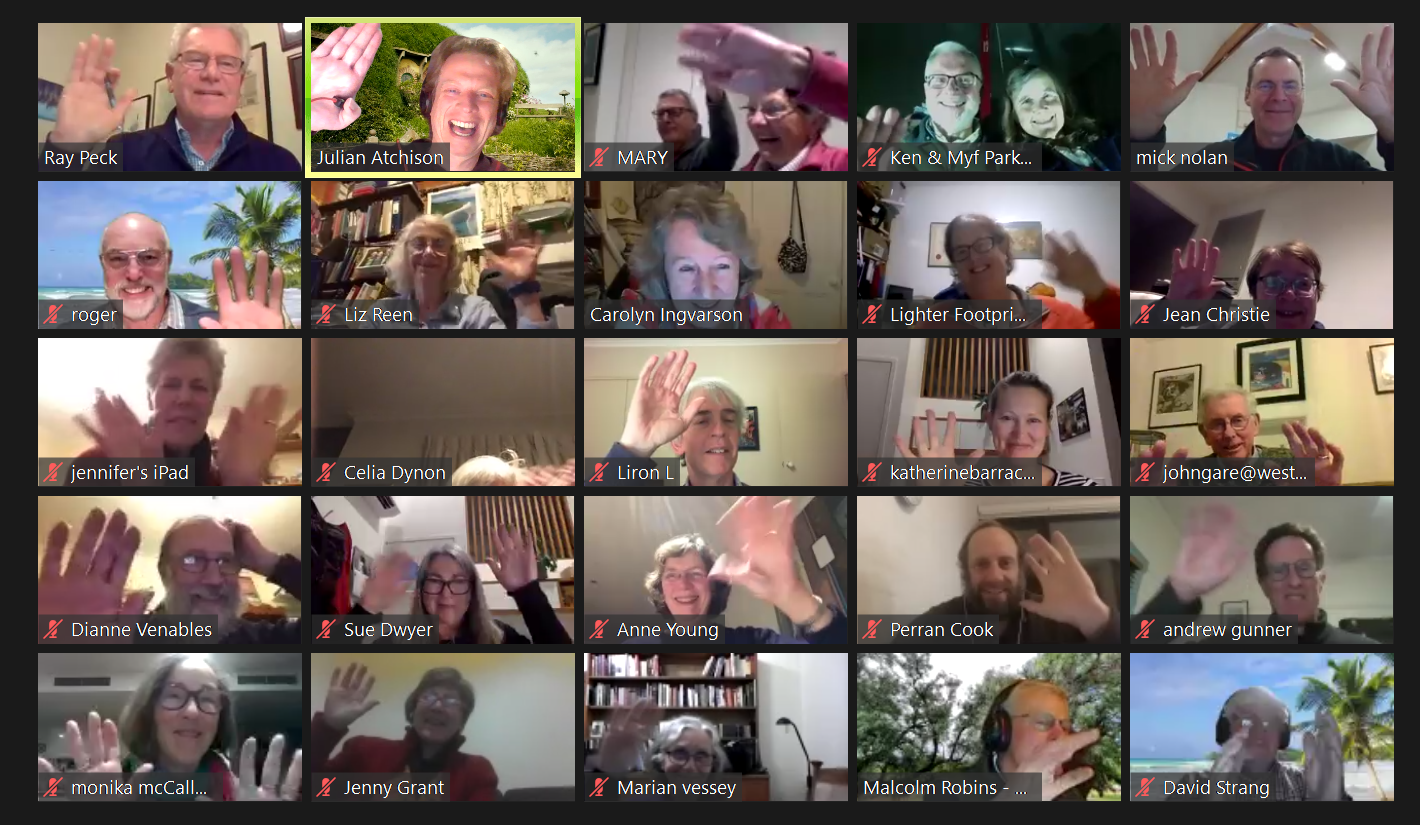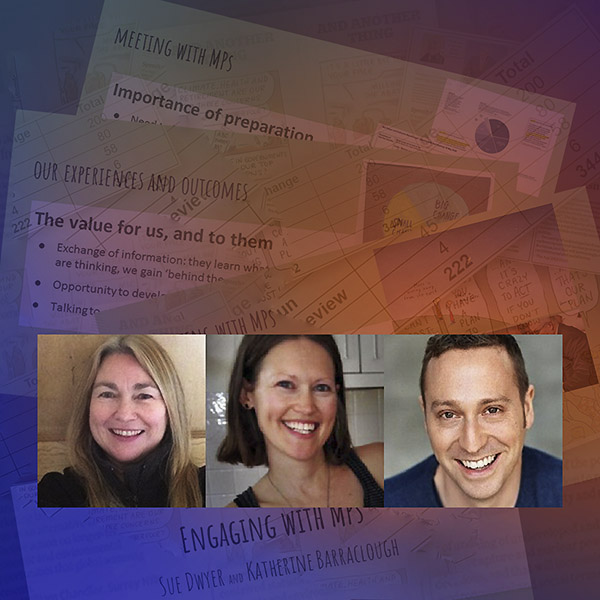Last Wednesday eighty Lighter Footprints Zoom-ers were joined by three terrific speakers to discuss effective climate communications.
Climate Conversations
First we heard from Mike McEvoy, Program Manager at Climate for Change (C4C). C4C’s Climate Conversations program has been running for several years and the team has just finished a massive review of the program’s impact (full report here). Climate conversations bring groups of friends, families and neighbors together to discuss climate action in a facilitated discussion aimed at empowering participants to step up and take more climate action.

Since 2015 more than 7,500 people have attended a conversation and the impact review showed that the program is reaching its target audience. Roughly based on Rebecca Huntley’s Six Australias, C4C is reaching out to Australians in the Active, Passive and Wavering categories and encouraging them to take the next engagement step. Before and after stats for Climate Conversations show this is working, with attendees transitioning to the Active and Leader steps post-Conversation in high numbers!

Mike also let us in on a fascinating factoid: 58% of Conversation attendees were not on the subscriber list for any of the major environmental organisations, indicating that C4C is reaching a unique, untapped audience. Though the pandemic has put the breaks on face-to-face events, Climate Conversations are continuing very successfully via Zoom and C4C facilitators can’t wait to get back out there.
Mike and C4C are keen to get Climate Conversations happening more in Hawthorn and the surrounding areas. If you think you might want to Host a Conversation with your friends, family or neighbors you can register here. Becoming a Facilitator involves some training sessions (currently online), and you can find out more about what it involves here. We’ve already had a few Lighter Footprints members sign up to Host after last Wednesday night, and we’d love more of you to consider getting involved.
MP Engagement
We then segued into the main event for the evening: MP Engagement. Wanting people to step up their engagement is all well and good and many are chomping at the bit to get more involved, so what actions can you offer them?
Sue Dwyer is a long-time C4C volunteer and facilitator who kept hearing the same desperate question in her Conversations: “what can we do about this?” Sue’s idea was to coordinate and champion a network of MP Engagement Groups (or MPEGS for short). She was successful, and over the last two years they have become a key part of C4C’s strategic approach. People can have the best of intentions but are far more productive and motivated in a group environment where they can share a glass of wine and support each other to make change.
The groups offer a supportive, practical space for people to gain the confidence and skills to email, call or visit their MP, build a constructive relationship and push those MPs to support stronger climate policy. It was while striking up a relationship with her federal MP that Sue met Katherine Barraclough, board member and Victorian chair at Doctors for the Environment (DEA). A kidney specialist by day, Katherine was moved by the urgency and desperation of the climate crisis to become more active in her local area. Together Sue and Katherine have formed a great tag-team and become regular visitors to Labor MP Ged Kearney (amongst others).
Why is it so important to engage with MPs?
We’re so lucky to live in an open, accessible democracy. MPs represent us. They care what their constituents think because they want their votes. And – most importantly – they can’t know what we think and want unless we tell them. Urgent, high-volume engagement with MPs around climate is needed. Individuals and businesses are leading the charge, but the government makes big picture decisions and sets clear guidelines.
The MPEGs are expanding their reach – they’re now up to about 15,000 emails and are working to build engagement with moderate Liberal MPs on the Zali Steggall Climate Act. Sue’s very excited about a couple in North Sydney gathering together more than 100 constituents to directly engage with moderate Liberal MP Trent Zimmerman with a simple demand: support this bill or be voted out. A powerful message for an MP in a marginal electorate!
What works with MPs?
Noise, as Labor MP Mark Butler calls it! More emails, more phone calls (preferably after email contact has been made), more visits, and regular, reliable contact. The more good, constructive correspondence they receive from a wide range of constituents, the more an MP sits up and takes notice. And MPs like Butler, who are sympathetic to the climate action message, request that we make much more noise! Cultivating an ongoing relationship is also a good idea, though it can be tricky.
Preparation, preparation, preparation
Most MP meetings will be 30 mins, perhaps longer if you’re lucky or if the MP is really interested. They can even be shorter if the MP is running late or has to dash: Sue recalls a meeting cut short at Victorian Parliament on Spring St when the bells rang to call MPs back into parliament for a vote! Your main points (keep it to 2-3 max) need to be clearly explained within 15 mins. Keep the proceedings short and punchy, make sure everyone has talking notes/scripts and knows when they’re speaking. You also need to have your headline messages and “asks” sorted before you go into the meeting. An ask can be for an MP to speak in parliament in support of something, vote a particular way, take a question to a colleague, get you information or even access – whatever it is a concrete ask is vital to a good MP meeting.
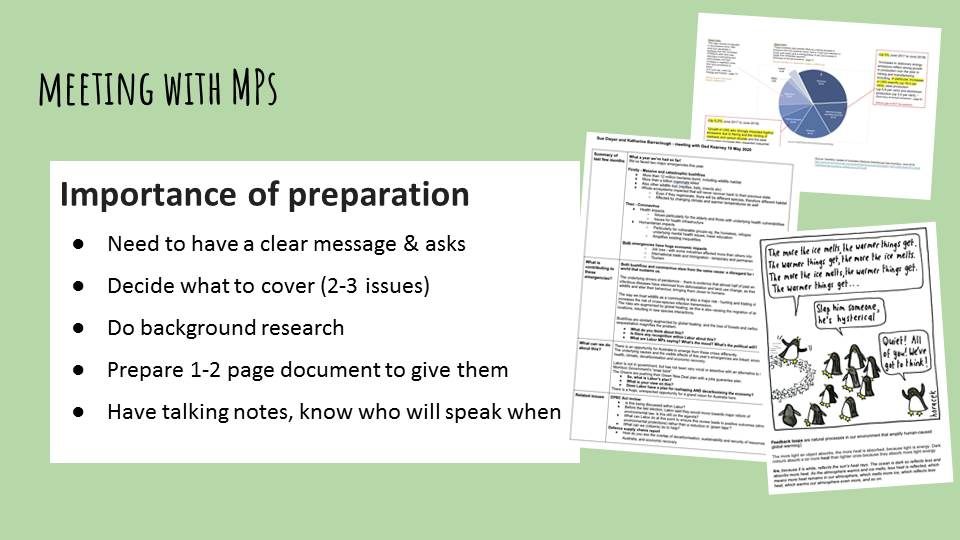
If you do your research it should be straightforward to prepare a 1-2 pager to give them. Complicated reports are rarely read by time-poor MPs, and you want to leave them with a useful briefing document with proper references. Graphics and comics are great: Sue recalls a snappy penguin cartoon they gave to Ged Kearney even making it onto the office noticeboard!
What happens during the meeting?
Katherine and Sue make a valuable point here: MPs are chatty and are great at hijacking the conversation towards their preferred talking points. 30 mins goes very quickly if an MP gets off-track, so controlling the meeting is important: using your handout to set a simple agenda is good practice. A terrific steering phrase to get things back on track is “That’s great, however what we’re here for today is…” (hence the need to have a concrete ask). Keeping to an agenda takes practice, and you shouldn’t be disheartened if your MP meeting ends up that way: learn from it and use different strategies to keep it on track.
Asking is critical. MPs tune out if you are just telling them stuff and want to answer questions. But questions need to be carefully framed so you don’t end up being talked at. Well-worded questions can also take the place of simply delivering facts to your MP (eg. “Do you know what % of Australians were impacted by bushfire smoke last summer?”)
Personal stories also work very well to get your message across. In a recent meeting with federal Environment Minister Sussan Ley, Katherine talked about how hard it was being the parent of two young kids during the bushfires, with smoke forcing them indoors for much of the summer (as well as the health impacts of smoke and respiratory distress on her patients). Emotion is just more memorable, and it’s very hard for them to disagree with how you’re feeling on an issue – so use it to your advantage.
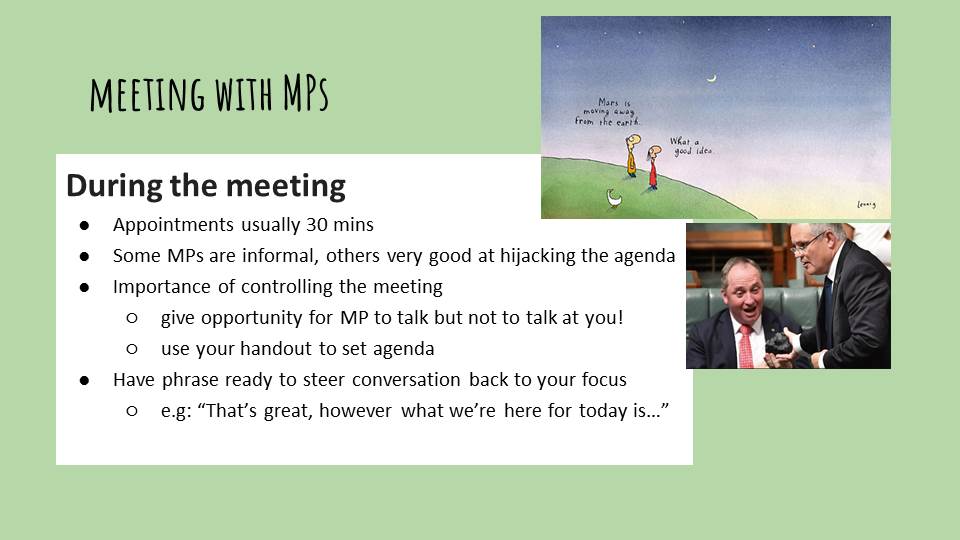
And, one last time, remember to tell them directly what you want them to do! A follow-up email to the meeting should include a summary of the discussion and the action they agreed to take for you.
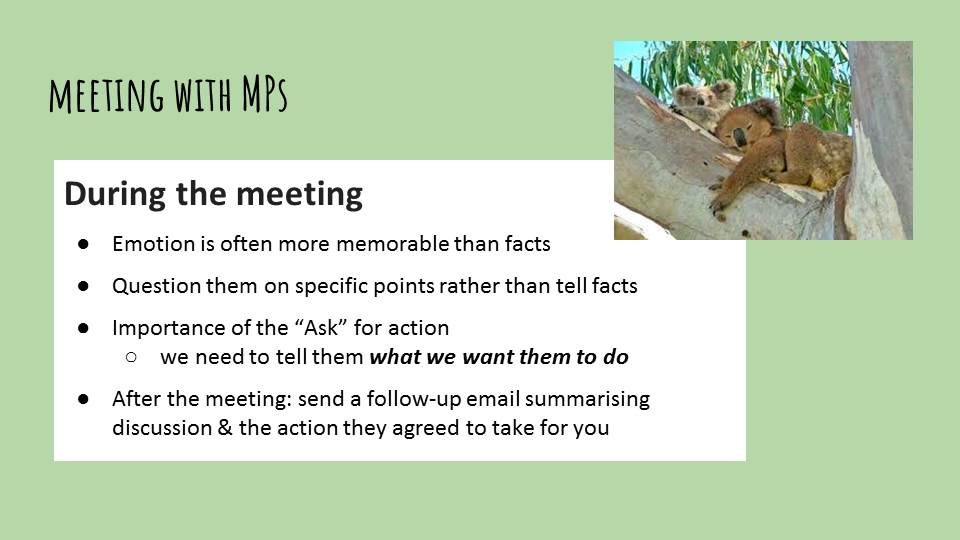
Value for us, value for them
Good MP meetings need to feel like a two-way process: they learn more about their constituents, and you learn more about the backroom processes. An ongoing, respectful relationship benefits both of you, and most MPs are keen to develop this. Talking with staffers is also extremely helpful. Even if the MP is unavailable, a staffer may be able to help get you information or provide you with feedback: eg. a staffer from Ellen Sandell’s office assisted in obtaining valuable information for a DEA Victorian Senate Inquiry submission.
Experiences with MPs
Ged Kearney is Sue and Katherine’s biggest success, with a positive relationship over the last two years. Sue remembers being quite scared before the first meeting, and then surprised to discover that Ged really didn’t know that much about climate change! Sue ended up helping Ged with the climate change section of her maiden speech, even getting an official mention in the parliamentary Hansard. Even if Labor has gone quiet on climate change, fruitful discussions with Ged continue thanks to a close relationship.
Mark Butler is another Labor MP Sue and Katherine have met with on several occasions. As the Shadow Minister on Climate and Energy Mark has given them insights into legislation and committee processes, as well as valuable information on Labor’s evolving stance on climate.
In Victoria, Sue and Katherine found a meeting with Upper House MP Fiona Patten one of their most important experiences. Fiona was open, helpful and explained a lot of Victorian Upper House processes and the value of sharp parliamentary questions. The importance of Independents in the Victorian Upper House is huge – they are necessary for the Andrews Labor government to pass legislation. With an upcoming review and revision of Victoria’s emissions targets, these MPs should be top of the list for potential visits.
New resources
Climate for Change has put all MP engagement resources up on their website so they are accessible by anyone and everyone. They’re under the “Take Action” menu tab – How to engage with your MPs. It’s a work in progress, but please feel free to share and use. Direct link is https://www.climateforchange.org.au/mpeg_resourcesnew
There’s a bunch of issue briefings and templates on the How to write to your MP page https://www.climateforchange.org.au/mpeg_issues2 which will be updated regularly.
Q&A
What’s the best way to amplify your message and asks?
DEA has quite a strong media reach and so our key MP meeting messages get out that way. Never underestimate a good letter either. Follow everything up. Follow the MP on social media and engage with them that way. Letters to the editor and visible actions are also important.
Can you engage MPs on two fronts eg. racism and climate?
It’s better to be strategic and optimise your gains, which often means sticking to one key topic. It’s worth remembering that a second topic is a good excuse for setting up a second meeting!
Tips for engaging with difficult MPs?
Even difficult MPs are worth visiting – they need to be aware of community views and be seen to be engaging constituents. A hard case like Kevin Andrews was made easier by connecting on shared interests (cycling) and strategic letters to the editor in the local newspaper.
What’s meeting MPs like in a pandemic?
We had quite a few meetings lined up that got cancelled, but we’ve followed quite a few of them up and rescheduled for Zoom etc. Online meetings are actually quite efficient!
Do you absolutely have to be a constituent to visit an MP?
You really need a constituent in the meeting. If you’ve got someone who is an expert in one of the MP’s areas of responsibility they’re a valuable attendee (whether a constituent or not).
Which MP do you start with?
Start local and lower house. You can move onto moderate or upper house MPs after that.
What’s the key to building an ongoing relationship?
Remember, your MPs are human! Stay friendly, keep the dialogue open and highlight good things they do.
How do we get through to Liberal and National MPs?
Credibility is important. Appearing like your group represents the voice of the community is beneficial. Volume is also important here, to make sure the same message gets through from a lot of angles. Big petitions are good. Running campaigns that get a big swing against incumbent politicians gets their notice and may get you through the door post-election. But it’s really worth persisting, even just to sprinkle seeds and set the table for later engagements.
Thanks so much to Mike, Sue and Katherine for a terrific evening.
You can relive the night via the speaker slides, Tweet string and Facebook Live recording.
Make sure you join us Wednesday 29 July at 7:30pm for an indigenous perspective on climate action with Senator-elect Lidia Thorpe. Register here.
